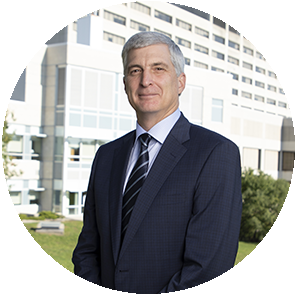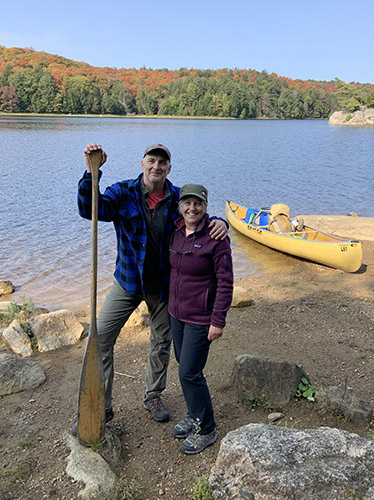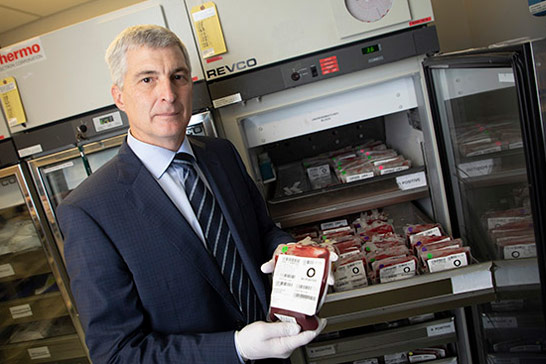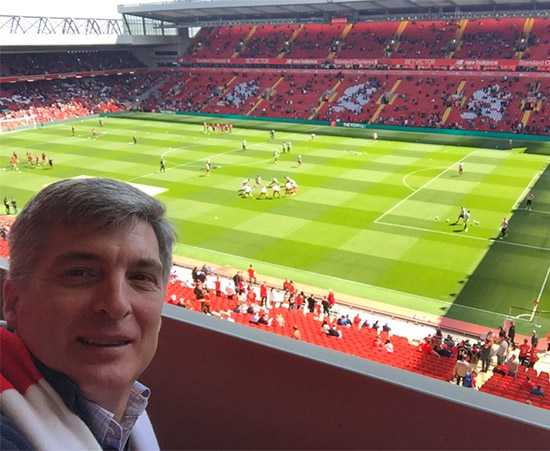
When Dr. Dean Fergusson’s research career began 25 years ago, the Canadian blood system was robust and transfusions were very safe — and both are still true today. But the field was also ripe for research, with a multitude of unanswered questions.
During his time at The Ottawa Hospital, Dr. Fergusson has answered some of these questions with his revolutionary research. One of his studies, for example, showed that a cheaper, generic drug used to prevent blood loss during surgery is actually safer than a much preferred and costlier version. Another study showed fresher blood was no better, and perhaps even somewhat harmful, compared to older stored blood. Both discoveries transformed our understanding of blood and transfusions.
Dr. Fergusson’s research has tangible outcomes; it has already saved thousands of lives and improved blood transfusions for millions of people around the world. Now, he’s training the next generation of researchers to make sure the important questions keep getting asked — and answered.
Q: Can you tell us a little bit about your childhood?
A: I was born in North Vancouver, but I grew up all over B.C. because my dad was in banking. I spent most of my childhood outdoors, doing a lot of hiking and fishing and sports. It certainly gave me an appreciation for nature and the diverse geography of B.C. I also played soccer from when I was young and into my twenties, which led to coaching my three sons. I was a weird kid in that I loved school, especially the sciences.
“Through my upbringing, my dad and my mom would say, ‘If you’re going to do something, do it well.’ All that stuck with me.”
— Dr. Dean Fergusson
Looking back, trying to put your life together, you see little things that are still with you today. For me, that would be a love of sciences and the outdoors.

Q: How did you wind up pursuing blood transfusion research?
A: I got into McGill’s political science and economics program and fell in love with health policy. I met my future wife there and we moved to Ottawa in the early ’90s. I was trying to get into the government, but I was getting nowhere. On the advice of a good friend, I applied to the Master’s of Health Administration at the University of Ottawa. It was during a course in epidemiology that I knew it was what I wanted to do. It was taught by Dr. Robert Cushman, who was Ottawa’s medical officer of health from 1996 to 2005. It was his passion and teaching style that made me realize this is what I want to do. I finished up my masters in a couple years and started applying for jobs in the hospital-based research field. I was fortunate enough to be hired right out of my masters at The Ottawa Hospital, working with Drs. Andreas Laupacis and Ian Graham.
It was just an amazing, amazing experience. I couldn’t ask for two better mentors. As they say, the rest is history! They encouraged me to go on to do a PhD in epidemiology focusing on blood transfusion research because there were so many unanswered questions. The recipe was there for success: getting my PhD, learning more elaborate methods of design and analysis, and applying it to a field that was ripe for research — the transfusion medicine field. The marriage of these led to a productive and rewarding career.

Q: What do you find so exciting about research?
A: Going back to high school chemistry and physics classes, I was always fascinated that to carry out an experiment properly, you had to follow it to a T — there’s a recipe, a method to the madness, or else the experiment won’t work. Through my upbringing, my dad and my mom would say, “If you’re going to do something, do it well.” All that stuck with me. The beautiful thing about research is you can bring clarity to important questions, but you only bring that clarity if you do it well, and that includes getting the questions right. Drs. Laupacis and Graham instilled in me getting the question right and answering it in the right manner. What I love about research is the ability to make a real difference. If you have a question that needs answering, and you answer it, you can help define practice or change practice.
Q: What does receiving the Grimes Career Achievement Award mean to you?
A: It means a ton to me, to be frank. I think it’s a recognition of a career of making a difference. My peers nominated me and supported the application — that’s precious to me. On a personal note, I knew Dr. J. David Grimes when I first started my career. Dr. Grimes was still involved with the Loeb Research Institute, which is where I started, and he was a phenomenally kind and gentle man, a gentle leader. It definitely brought back memories.

Q: What do you get up to when you’re not in the lab?
A: My interests are definitely travel, and specifically canoe camping. My one regret is not knowing about Algonquin Park earlier, when we first arrived in Ottawa — it’s a treasure. I also enjoy long walks and hikes on rural trails with our blue heeler.
I’m also a big live music guy, preferably in smaller venues. I love just going out and seeing acts I haven’t seen before. You get to know the venues in the city and nearby towns. One of our favourite acts is the Skydiggers out of Toronto. The wealth of talent that comes through, the raw talent, is incredible.
It’s also worth mentioning I’m still a huge football (or soccer) fan, and I cheer on Liverpool.
Q: What’s next for you, personally and professionally?
A: Professionally, I’ve got a couple big studies. One is wrapping up on whether having female or male donors makes a difference for transfusion recipients. We randomized 9,000 patients at The Ottawa Hospital who got transfusions exclusively from male or female donors. Animal and observational work shows there could be differences related to hormone levels. The results will be out soon.
Personally, I’m waiting for the pandemic to be over so I can travel more. I do miss that. In the meantime, I love watching my family grow and their careers grow.
Q: Lastly, what stands out about your work at The Ottawa Hospital?
Looking back, it’s the mentorship. It instilled in me the importance of having your champions — and I love having that role myself now. The Ottawa Hospital environment has been an exceptional place to work, and it’s really what’s kept me here. You get other offers in places like Toronto, Montreal, or Vancouver, but it’s such a great environment, and there’s still more to do here.
“There is still so much more potential at The Ottawa Hospital. With our people, our ideas, and the outstanding clinical and research environment, we can impact the lives of patients and their families around the world.”
— Dr. Dean Fergusson

